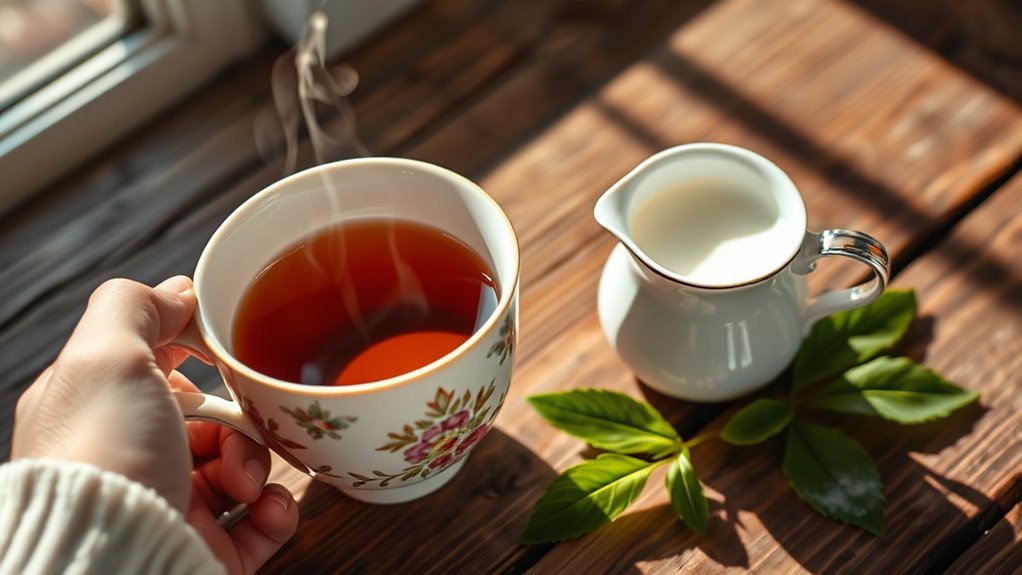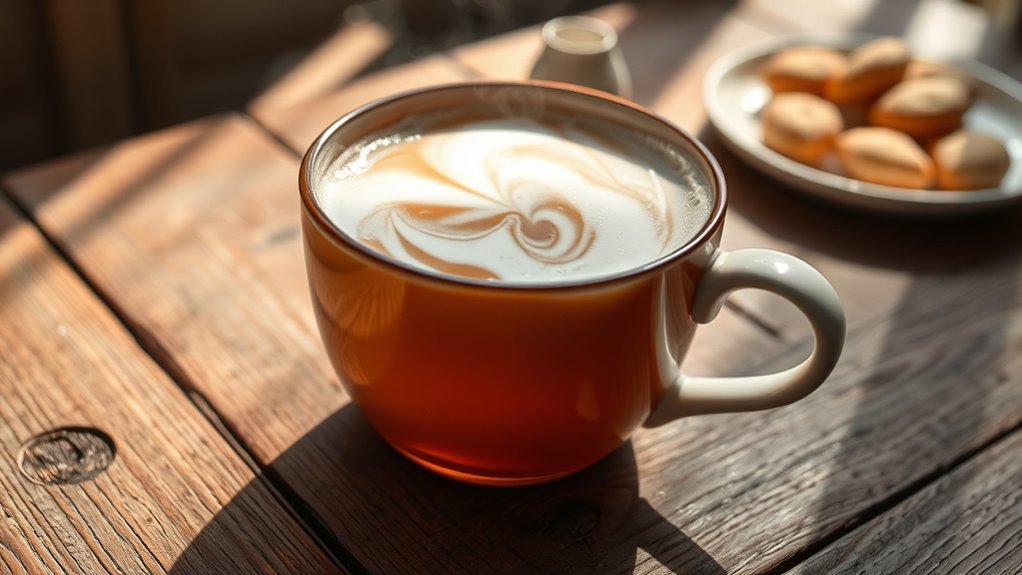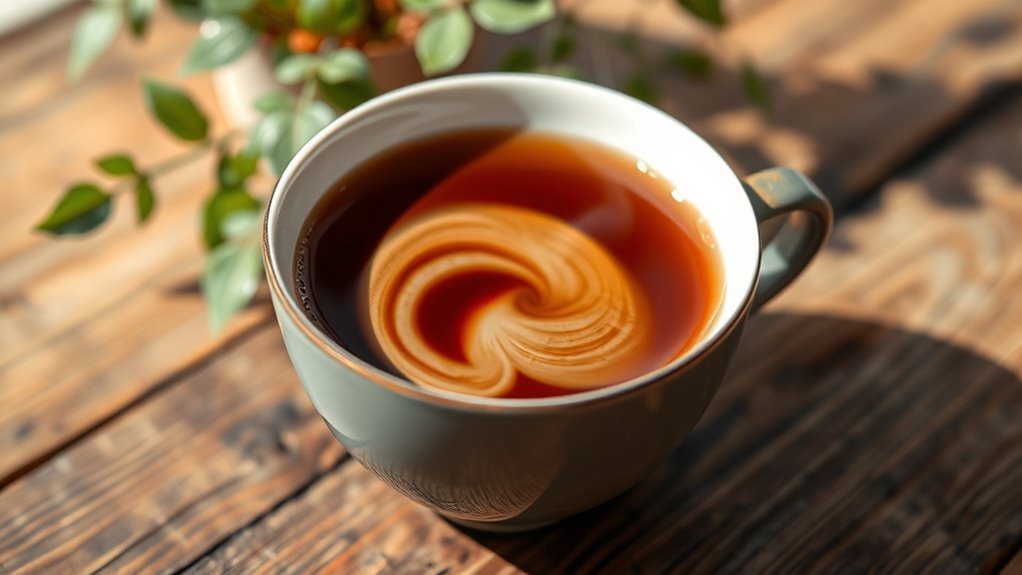Yes, you can drink tea with milk on a keto diet, but you need to choose low-carb milk alternatives to stay within your daily carb limits. Regular milk contains around 11-13 grams of carbs per cup, which can hinder your ketosis. Opt for unsweetened nut milks, like almond or macadamia, or use coconut cream for added healthy fats. Adding spices or flavorings can enhance your tea without adding carbs. Discover more tips on how to enjoy tea while maintaining your keto lifestyle.
Understanding the Keto Diet and Its Principles

When you begin the keto diet, it’s essential to grasp its foundational principles to maximize benefits. The primary goal is to shift your body into a state of ketosis, where it burns fat for energy instead of carbohydrates. This requires adhering to specific dietary restrictions, typically limiting carb intake to about 20-50 grams per day. You’ll focus on high-fat foods, moderate protein, and very low carbohydrates. Understanding these keto principles helps you navigate your food choices effectively. Emphasizing healthy fats—like avocados, nuts, and olive oil—while avoiding sugary and starchy foods is key. By internalizing these guidelines, you’ll empower yourself to make informed decisions, enhancing your journey toward improved health and freedom in your dietary choices. Additionally, being aware of carbohydrate content in foods like legumes can help you maintain your daily limits and support your keto goals.
Traditional Milk Options and Their Carbohydrate Content

Many people enjoy milk as a staple in their diets, but on a keto regimen, it’s important to evaluate the carbohydrate content of traditional milk options. Whole cow’s milk contains about 12 grams of carbohydrates per cup, which can greatly impact your daily carb limit. Skim milk has even more, around 13 grams per cup. Goat’s milk is similar, with approximately 11 grams of carbs. For those watching their carb intake, these traditional milk options might be too high. While they offer nutritional benefits, such as calcium and vitamin D, it’s vital to weigh these against your keto goals. Understanding the carbohydrate content of traditional milk can help you make informed choices that align with your dietary needs. Incorporating low-carb milk options can provide alternatives for those on a keto diet without compromising on taste.
Keto-Friendly Milk Alternatives

If you’re following a keto diet and still want to enjoy tea with milk, there are several keto-friendly milk alternatives that can fit seamlessly into your meal plan. Nut milk, especially almond and macadamia, is low in carbohydrates and can add a creamy texture to your tea. It’s important to choose unsweetened varieties to avoid hidden sugars. Another excellent option is coconut cream, which not only enhances the flavor but also provides healthy fats that align with your keto goals. Both nut milk and coconut cream can be easily incorporated into various tea blends, allowing you to savor your drink without compromising your dietary needs. Additionally, almond milk is rich in vitamin E and can contribute to your overall health while maintaining your carb limits.
How to Prepare Tea With Milk on Keto
Incorporating keto-friendly milk alternatives into your tea can elevate your beverage while keeping it compliant with your diet. For ideal tea preparation, start by brewing your favorite tea using hot water, allowing it to steep for the recommended time. Once your tea is ready, consider adding a milk substitute like unsweetened almond milk, coconut milk, or heavy cream. Each of these options provides a creamy texture without the carbs found in traditional dairy. Stir gently to combine, ensuring the milk substitute blends well with the tea. If you prefer a frothy texture, use a milk frother. Always check labels for added sugars in milk substitutes, as these can impact your ketosis. Additionally, using unsweetened varieties of milk alternatives helps maintain low carb intake. Enjoy your delicious, keto-friendly tea!
Flavor Enhancements for Your Keto Tea
While tea alone can be invigorating, adding flavor enhancements can transform your keto beverage into a delightful experience. Consider incorporating spice additions like cinnamon or ginger, which not only elevate the taste but also offer potential health benefits, such as improved digestion and anti-inflammatory properties. Herbal infusions like peppermint or chamomile can provide a revitalizing twist while keeping your drink keto-friendly. You might also explore adding a splash of unsweetened vanilla extract or a few drops of stevia for a hint of sweetness without the carbs. These enhancements not only make your tea more enjoyable but also align with your keto goals, allowing you to indulge in a flavorful experience without compromising your dietary choices. Enjoy experimenting! Additionally, using unsweetened almond milk as a creamer can provide a low-carb alternative to traditional dairy while enriching the overall flavor.
Tips for Staying on Track With Keto While Enjoying Tea
Staying on track with your keto diet can be challenging, especially when it comes to beverage choices like tea. However, you can enjoy tea while maintaining your keto lifestyle by following these tips:
Sticking to your keto diet can be tricky, especially with beverage choices like tea, but there are ways to enjoy it guilt-free.
- Choose low-carb teas: Opt for herbal, green, or black teas that contain minimal carbs, allowing you to reap the tea benefits without jeopardizing your diet.
- Be mindful of additives: Avoid sugar and high-carb creamers. Instead, use keto-friendly alternatives like unsweetened almond milk or a dash of heavy cream.
- Monitor your intake: Keep a log of your tea consumption to guarantee it aligns with your daily carb limits, making it easier to enjoy without guilt. Additionally, incorporating keto-friendly fats into your tea routine can enhance flavor and support your dietary goals.
Frequently Asked Questions
Can I Drink Herbal Tea With Milk on Keto?
Yes, you can drink herbal tea with milk on keto, but it’s best to choose milk alternatives. Almond milk or coconut milk can provide a creamy texture without adding too many carbs. Herbal teas offer various benefits, such as antioxidants and relaxation properties. Just be mindful of the milk’s carb content, and adjust your intake accordingly to stay within your daily limits. Enjoy your tea while embracing the freedom of your keto journey!
What Are the Best Teas for a Keto Diet?
For a keto diet, green tea and chai tea are excellent choices. Green tea’s rich in antioxidants and can boost metabolism, helping with fat burning. Chai tea, made with spices like cinnamon and ginger, adds flavor and may support digestion. Both options are low in carbs, fitting perfectly into your keto lifestyle. You can enjoy them without worrying about exceeding your carb limits, giving you the freedom to savor your drinks.
Does Tea With Milk Break a Fast on Keto?
Drinking tea with milk can break a fast on keto, especially if you’re aiming for the fasting benefits like improved fat oxidation. For instance, if Sarah adds whole milk to her tea, she might negate the calorie restriction that fasting provides. Instead, consider milk alternatives like almond or coconut milk, which are lower in calories and carbs. These options can keep you in a fasted state while allowing you to enjoy your tea.
Can I Use Flavored Milk Alternatives in My Tea?
Yes, you can use flavored almond or coconut milk in your tea. These alternatives can add a delicious twist while keeping your beverage low in carbs. Flavored almond milk typically contains around 1-2 grams of carbs per serving, while unsweetened coconut milk has even fewer. Just be cautious about added sugars in flavored options, as they can affect your keto goals. Always check the labels to verify they fit within your dietary plan.
How Does Caffeine in Tea Affect Ketosis?
Caffeine in tea can actually enhance ketosis for some people. It boosts metabolism, which may help in burning fat more effectively during keto adaptation. Studies show that caffeine can increase energy expenditure and fat oxidation, making it beneficial for those on a ketogenic diet. However, individual responses to caffeine can vary, so it’s important to monitor how it affects your body and adjust your intake accordingly to maintain your desired state of ketosis.
Frequently Asked Questions about Drinking Tea with Milk on Keto
1. Can I drink tea with milk while on a keto diet?
Yes, you can drink tea with milk on a keto diet, but it’s important to choose the right type of milk. Full-fat, low-carb milk options such as heavy cream or unsweetened almond milk are more suitable for keto dieters. Regular cow’s milk contains lactose, which can add unwanted sugars and carbohydrates that may hinder your ketosis.
2. What types of milk are best for keto-friendly tea?
The best milk options for keto-friendly tea include heavy cream, unsweetened almond milk, coconut milk, and macadamia nut milk. These options are low in carbohydrates and high in fats, making them ideal for maintaining ketosis. Avoid regular cow’s milk or sweetened plant-based milks, as they typically contain higher sugar levels.
3. How does adding milk to tea affect my carb intake on a keto diet?
Adding milk to tea can increase your carb intake, especially if you use regular cow’s milk. For example, one cup of whole milk contains approximately 12 grams of carbohydrates. In contrast, heavy cream has less than 1 gram of carbs per tablespoon. It’s crucial to calculate your total daily carb intake and choose milk alternatives that fit within your keto limits.
4. Are there any benefits to drinking tea with milk on a keto diet?
Drinking tea with milk can provide several benefits on a keto diet. The combination can enhance the flavor, making tea more enjoyable, while adding healthy fats from milk alternatives can help you feel fuller for longer. Additionally, the antioxidants in tea can offer health benefits, such as improved metabolism and reduced inflammation.
5. Can I use flavored creamers in my tea while on keto?
It’s essential to be cautious with flavored creamers, as many commercially available options contain added sugars and carbohydrates that can disrupt ketosis. If you wish to use flavored creamers, look for those specifically labeled as keto-friendly, which often use sugar substitutes like erythritol or stevia. Always check the nutritional label to ensure they fit within your dietary goals.


